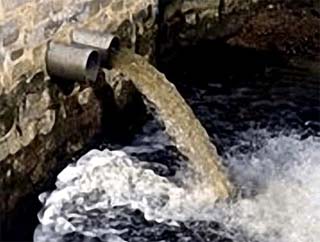North: The villages are polluted, people are sick
On March 8, Vietnam News Agency quoted Mr. Pham The Bao, Chief of the National Steering Committee for Clean Water Supply and Environmental Hygiene, said that in the craft villages in the North, the level of pollution The environment is increasing at an alarming rate.
A recent survey by the Institute of Environmental Science and Technology (Hanoi University of Science and Technology) and the Ministry of Science and Technology showed that 100% of wastewater samples in craft villages give pollution parameters exceeding standards for permission.
There are about 700 craft villages in the Red River Delta region, accounting for nearly half of the country's trade villages. Surface water and groundwater all show signs of pollution, especially water in the agricultural product processing villages, textile dyeing. Most handicraft villages have small-scale and manual-scale households.
Particularly in Hanoi, a survey in 40 communes also showed that about 60% of communes are heavily polluted from production activities.
In metal recycling villages, untreated toxic gases are discharged directly into the air as in Dong Mai lead recycling village (Hung Yen), lead concentrations exceed 2,600 times the permitted standard. Tanning industry, making dongs in Ha Tay also regularly emit substances such as flour, skin, and fat that make fast water stink, pollute many rivers flowing through craft villages.

Discharge of wastewater into water sources(Photo: Monre.gov.vn)
Many craft villages also cause excessive noise and dust.
The above situation has affected much to the health of the village people.
Research results of the Institute of Labor Protection recently showed that in the craft villages, the highest incidence of respiratory-related diseases such as sore throat accounted for 30.56%, 25% bronchitis or accounted for nerve pain. 9.72%.
In Dong Mai lead recycling village, the proportion of people suffering from neurological diseases accounts for about 71%, respiratory diseases account for about 65.6% and having red blood cells accounts for 19.4%.
In the wine production village of Van Ha (Bac Giang) the rate of skin diseases is 68.5% and intestinal diseases is 58.8%.
According to Mr. Pham The Bao, in order to minimize environmental pollution in craft villages in the Northern Delta, localities need to link planning to build trade village industrial clusters with the treatment of environment and concentrated waste. At the same time, enhance the awareness of the community on environmental protection and enhance the transfer of advanced production technologies, in accordance with local conditions.
* Regarding the issue of environmental pollution, before that, on March 6, Vietnam News Agency also reported that the Prime Minister had just issued a document requesting 6 localities including Hanoi, Hoa Binh and Ha Tay. , Ha Nam, Nam Dinh, Ninh Binh and other related ministries and agencies immediately implement environmental protection measures in the Nhue and Day rivers.
The Prime Minister asked localities and authorities to soon complete the "Master Plan on Environmental Protection in the Nhue and Day Rivers", to submit to the Prime Minister before June 30;
The Prime Minister asked the Ministry of Natural Resources and Environment to support establishments to thoroughly handle environmental pollution, soon complete and issue a system of Vietnamese environmental standards, including waste discharge standards into streams. river.
The Prime Minister also directed localities to soon complete the renovation and construction of a new system of rainwater and waste water treatment for urban centers and residential areas around the two river basins, ensuring that by 2020 version of treatment of environmental pollution caused by urban domestic wastewater.
- Nhue and Day rivers are heavily polluted
- Body odor changes when near sick people
- Planting reeds to treat polluted river water
- The smart home knows that the owner is sick
- The most powerful electric ferry in the world
- Why are people usually sick?
- The North is twice as polluted
- Why are people sick when stressed?
- Why are children and elderly people prone to getting sick?
- The most heavily polluted cities
- Thinking you sick will make you sick
- Why do people with SARS not get sick?
 Is the magnetic North Pole shift dangerous to humanity?
Is the magnetic North Pole shift dangerous to humanity? Washington legalizes the recycling of human bodies into fertilizer
Washington legalizes the recycling of human bodies into fertilizer Lightning stone - the mysterious guest
Lightning stone - the mysterious guest Stunned by the mysterious sunset, strange appearance
Stunned by the mysterious sunset, strange appearance